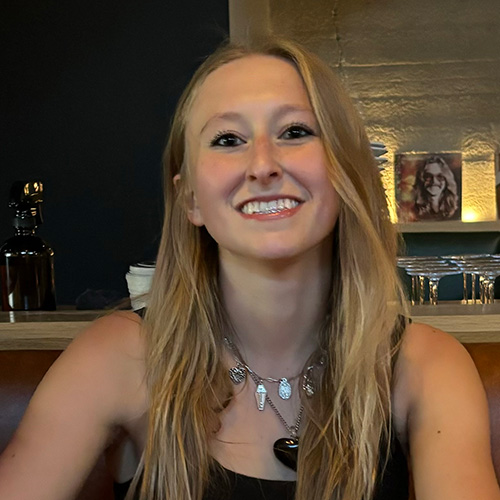John R. Park Debate Society Spotlight | Samantha Watrin

Samantha Watrin (she/her) is a sophomore, double majoring in Computer Science and Political Science. As a member of the John R. Park Debate society, Watrin participates in six distinct events: National Parliamentary Debate Association (NPDA) debate, National Forensic Association (NFA) Lincoln-Douglas (LD) debate, Informative, Persuasive, Impromptu and Extemporaneous speaking. She qualified for Nationals in six events and secured qualification for international competition in all five events offered at the tournament. At the International Forensics Association (IFA) annual tournament, Samantha advanced to elimination rounds in persuasive, informative, and extemporaneous speaking. Her impressive results at IFA include earning 1st place in Extemporaneous Speaking, 2nd place in Informative Speaking, and 3rd place in Persuasive Speaking.
Throughout the season, Samantha made 18 appearances in final rounds for speech and advanced from preliminary to elimination rounds in debate four times. Notably, she competed in Lincoln-Douglas (LD) debate three times and emerged as the champion in each instance. Watrin was recognized as the Top Individual Performer at both the Western States Communication Association annual tournament in Albuquerque, New Mexico, and the International Forensics Association annual tournament in Incheon, South Korea.
Get to know Samantha:
Q: How did you first get involved with the University of Utah’s Speech & Debate Team,
and what drew you to debate?
A: I joined the team my first semester of freshman year and have been competing on it ever since. Throughout high school I was always really involved in debate because of how much I love developing arguments and improving my delivery skills.
Q: What has been your proudest moment or biggest accomplishment on the team so far?
A: Last year at the Parliamentary Debate National Tournament I made it to Octafinals with my partner and took 7th in speaker awards.
“Sam is an incredibly driven individual whose desire for success is reflected in the efforts she puts into speech, debate, and educational endeavors.” - Ashton Poindexter, Assistant Coach
Q: Debate requires both individual preparation and teamwork. How do you balance these aspects in your own competition strategy?
A: Developing and honing my own skills has helped me be a much better part of the team. If I am bringing my best and working to collaborate with others that is when everyone succeeds.
Q: Competing in events and tournaments can be intense. What has your experience been like, and how does it feel to participate as a team?
A: It has definitely been a difficult experience, but because of the rigor of the competition it is incredibly rewarding when I reach my goals. It is also so cool to see the other members of my team working hard to accomplish their goals.
Q: What is your go-to strategy when preparing for both parliamentary debate and individual events? Do you have any unique rituals or routines?
A: Doing warmups with the team always gets me in the competition mindset, I also like to mentally run through certain arguments that I want to use in my rounds.
Q: How has being part of the Speech & Debate Team impacted your academic life and skills, such as critical thinking, public speaking, or teamwork?
A: My public speaking has improved exponentially over the time I have spent in speech and debate. On top of that, my critical examination skills are significantly better now that I have utilized them repeatedly in debate rounds and preparation.
Q: What is something about debate competitions that might surprise people who aren’t familiar with the world of collegiate debate?
A: Debate competitors speak in a style called "spreading" in which they speak incredibly fast. In debate you have to practice being able to understand how to even understand such high rates of talking, and to someone who had not seen debate before this would be very jarring.
“Sam is an instrumental member of the team. She is not only successful in competition but has shown growth in leadership.” - Averie Vockel, Assistant Director
Q: The University of Utah’s Debate Society has a long history of excellence. What does it mean to you to represent such a longstanding and successful team?
A: I think that the longstanding success of the U has built up a program that gives really good resources to its students. Because of this, I want to make sure that I compete well with the resources I have been given.
Q: For new or prospective members considering joining the team, what would you say is the biggest benefit or most exciting part of being involved?
A: Debate has not only improved my academic capacity exponentially, I have also met some of my best friends on the team. Travelling to different places in and out of the country as well as competing at weekend-long tournaments forms very strong bonds with your teammates.
Q: How have the coaches influenced your experience on the Speech & Debate Team, and in what ways have they helped you grow or improve as a competitor?
A: The coaches are one of the best parts of being on the team. Having access to incredibly intelligent, skilled, educated coaches who care about my success has increased my skill and confidence within debate. The lessons that I have been taught by the coaches go beyond debate and have helped me in my real life.
Q: What is your favorite way to de-stress after a particularly intense debate competition or preparation time?
A: Because debate is so long and stressful during the tournaments, I tend to be very exhausted afterwards. During our drives home, I tend to sleep for around 7 hours in the van.
Q: What is something unique about you that not many people would know about?
A: I am also a teaching assistant for the Intro to Computer Science course taught at the U. This means that I get to teach people how to code.
Support the John R. Park Debate Society
